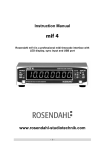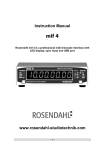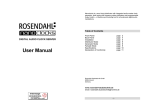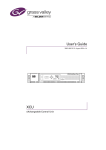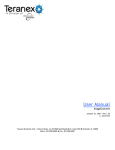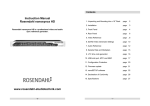Download Rosendahl nanoclocks GL Instruction manual
Transcript
Instruction Manual nanoclocks GL nanoclocks GL is a digital audio genlock masterclock with 12 word clock / AES11 DARS outputs and 2 reference inputs for SD video syncs, HD tri-level syncs, AES11 or word clock signals. www.rosendahl-studiotechnik.com -1- -2- Contents 1. Unpacking and Mounting into a 19" Rack 2. Connection to Power Supply 3. Installation & Connection Status 4. System Settings 5. Reference 6. Sample Rate 7. Output Mode 8. Setup Utility 9. Declaration of Conformity 10. Specifications -3- page page page page page page page page page page 4 5 6 7 8 11 11 12 13 14 1. Unpacking and Mounting into a 19" Rack nanoclocks GL comes with the following accessories: 1 pcs IEC 60320/C14 power cable 1 pcs USB cable 2 pcs 1U rack mount brackets, mounted 1 pcs user manual that you are now reading The unit is shipped with four small plastic feet mounted underside with Philips screws. If you want to rack mount your nanoclocks GL please detach the four plastic feet. For desktop use please detach the rack mount brackets using a metrical hex-wrench. -4- 2. Connection to Power Supply Attention! Before connecting to mains please check the voltage selector on the left side panel. Disconnect from mains before switching. Make sure the 115 / 230V setting matches to your local mains voltage. Use 230 VAC setting in the UK, EU. Use 115 VAC setting in the US, Japan. nanoclocks GL can also be powered by a 12 volt DC supply using the 4-pin XLR connector, pin 1 is Ground (-) and pin 4 is Vcc (+) 12V. The power button lights up green when the unit is powered by mains and changes to red when the power source is DC. If the DC supply drops below 10,6 Volts the red power LED starts blinking. Primary power source is always mains. Feed mains and DC supply simultaneously to power the unit from two redundant sources. When one of the sources fails the unit will keep working without disruption. -5- 3. Installation & Connection Status If you require no more than the 12 word clock/ AES11 outputs provided by the nanoclocks GL feed each digital audio unit with a separate clock line. Use 75 ohm coaxial (RG59) cables with standard BNC connectors for word clock or AES11 lines. It does NOT matter if the cables are 2, 5 or 10 metres long. Comment: To shift the phase of a word clock signal significantly, you would require a cable of some kilometers. Even a 50m cable will work without loss of quality within a facility with proper grounding. More important than the cable length are equal ground potentials at the source and the receiver. Similarly to analogue audio signals producing "hum" affected by different ground potentials, digital transmission lines can be worsened/ modulated by ground loops. Good studio grounding is essential, not only for word clock signals. To isolate ground potentials galvanically and for interfacing coaxial to balanced AES11 lines (XLR 3-pin) we recommend Neutrik Digital Audio Impedance Transformers NADITBNC-F / NADITBNC-M. -6- Correct termination is quite important to avoid cable reflections, especially for the higher frequency AES11 signals. The nanoclocks GL is monitoring the connection status on each output and displays the present state of termination. (1) Press the STATUS key. (2) buttons 1..12 for outputs 1..12 will display: off: output is open or not terminated, > 85Ω green: output is in use and terminated with 75Ω red: output is double/ low terminated, < 50Ω 4. System Settings Each of the three system buttons SETUP, SAVE and "on/off" must be pressed and hold for three seconds to enter setup mode, save the current settings or to enter power down mode. If you press these buttons shortly or unwittingly, there will be no action. In SAVE mode you can still use STATUS or MODE buttons to select the desired display mode. For all other settings you must enter SETUP mode first: Press and hold the SETUP button for 3 seconds. Press and hold the SAVE button for three seconds to store new settings to nanoclocks GL non-volatile memory. Press and hold "on/off" key for three seconds to enter power down mode. All clock outputs will be muted. -7- 5. Reference REFERENCE = INTERNAL: Press the INT. button to set the nanoclocks to its internal, temperature-compensated timebase accurate to 0.2 ppm (parts per million). INPUT buttons are set inactive and the sample rate buttons enter a blinking mode during the calibration process. After a few seconds the sample rate buttons will light up continuously to indicate LOCKED operation. REFERENCE = VIDEO: Press the VIDEO button to configure nanoclocks GL for videogenlocked operation. Both reference inputs A and B accept SD video syncs as well as HD tri-level sync signals (1080p, 1080i, 720p). Frame rates 23.98, 24, 25, 29.97, 30, 59.94 and 60 fps are detected automatically and the INPUT buttons light up continuously when a valid sync signal is present. When no valid sync signal applies the INPUT buttons start blinking. Nanoclocks GL will synchronise its audio clocks as soon as a valid video input signal is detected and the sample rate buttons will start blinking. As soon as synchronisation is stable, the sample rate buttons will light up continuously, indicating LOCKED to video syncs status. You can select manually INPUT A or INPUT B by pressing the according button. AUTO mode automatically switches to valid inputs, where input A is primary/ preferred. -8- Switching from INPUT A to INPUT B does not produce deviations on the synchronised audio clocks, stable operation will be obtained. All lock and relock procedures are operated very smoothly to guarantee continuous audio clock output signals during all stages: lock, hold, relock. If the video frame rate is a multiple of the sample rate, it is possible to lock the audio phase to video syncs. Then the rising edge of the word clock signal will be phase locked to the start of video line 1. Several nanoclocks GL units locked to the same video house sync will produce phase locked audio clocks. REFERENCE = AUDIO Press the AUDIO button to configure nanoclocks GL for audio genlocked operation. Both reference inputs A and B accept word clock as well as AES11 reference clock signals. If no valid audio clock signal is present the according INPUT button is blinking. Audio reference signals with 44.056, 44.100, 47.952, 48.000, 88.112, 88.200, 95.904, 96.000 kHz are detected automatically and the output sample rate will be set up accordingly. -9- The lock range of the nanoclocks audio crystal oscillators is +/- 50 ppm, which allows synchronisation to even strongly distuned audio clock references. Sample rate buttons light up continuously when the unit is LOCKED to the selected audio reference input signal. REFERENCE = DISTRIBUTION AMPLIFIER Press the DIST. AMP button to switch to distribution amplifier mode. The internal audio clock generators will be switched off and the input signals from INPUT A or INPUT B will be routed directly to all 12 outputs. No reclocking/ output formatting will be performed. When a word clock signal is detected, all outputs will be switched to word clock output mode, when an AES11 signal is found, all outputs will be switched to AES output mode. In distribution amplifier mode it is not possible to configure/ change the output mode manually. The sample rate buttons are set to inactive, but still serve to display the sample rate detected on the active INPUT. VARI displays non-standard sample rates, i.e. 50 kHz. INPUT A and INPUT B buttons are blinking if no valid audio clock signal (word clock or AES11) is found. AUTO mode automatically switches between valid inputs, but does not perform a seamless switchover as in AUDIO mode. The signal is not reclocked and must be absent for 40ms before a switchover is executed. - 10 - 6. Sample Rate Enter SETUP and select the new sample rate by pressing the respective button. Button -0.1% will apply a so-called pull down sample rate (x1000/1001) as used for video and film post-productions for NTSC frame rate compensation. Do not use pull down rates for standard audio applications. Sample rate buttons are blinking when the unit is relocking/ synchronising to a new reference or sample rate. When stable LOCK is achieved the sample rate buttons light up continuously. 7. Output Mode Enter SETUP and press the MODE button to change the output mode of outputs 1..12. By pressing buttons 1..12 you can select output modes: green: WORD CLOCK red: AES11 DARS digital audio refrence signal off: USER, in firmware version 1: output muted with the nanoclocksGL setup software you can configure each output individually for x2, x4, SPDIF and other output modes, coming later with firmware 2 Press and hold the SAVE button for three seconds to store new settings to non-volatile memory. - 11 - 8. Setup Utility The firmware version installed on your nanoclocks GL is displayed every time the unit is powering up. After a LED test (all LEDs light up from left to right) the connection and output status field LEDs will briefly show the current version (one digit only, current version is 1). Please visit www.rosendahl-studiotechnik.com for upcoming firmware versions and utility/ monitor programs, coming at the end of 2013. To boot in firmware update mode, please press and hold 88.2 and 96 kHz sample rate buttons while connecting the unit to mains. If in update mode, the 88.2 and 96 kHz buttons are continously illuminated. Now start the setup software and select the midi I/O ports. In Windows XP you must select the USB audio device, Vista or Windows 7 will list NanoclocksGL. Press the "Update firmware" buttom to start the update process. Do not disconnect the unit during firmware programming. nanoclocksGL is a so called "device class compliant USB Audio Device" and does not need a driver installation. Windows XP or later as well as Mac OS X provide generic USB audio drivers. If you plug in the unit for the first time, Windows will find the new hardware and install its generic drivers automatically. If nanoclocksGL isn't detected by Windows you may need to configure the Windows Device Manager to show all hidden and ghosted devices to evaluate the problem and possibly remove/delete obsolete devices. Find help at Microsoft support how to display ghosted devices in Device Manager…. - 12 - 9. Declaration of Conformity Rosendahl Studiotechnik GmbH Andechser Str. 5 D-86919 Utting a.A. Germany herewith confirms that the product: Type: digital audio genlock masterclock Model: nanoclocks GL meets the requirements of the council of the European communities relating to electromagnetic compatibility (Council Directive 89/336/EEC) Technical Data: EMV Electric Safety EN 55022, EN 61000 EN 60950 The CE symbol is awarded to high-quality appliances which comply with the European Directive 89/336/EEC or the EMVG (law relating to electromagnetic compatibility of appliances) and which offer the following significant benefits: *Simultaneous and interference-free operation of adjoining appliances *No unpermitted interference signals *High resistance to electro-smog This marking shown on the product or its literature indicates that it should not be disposed with other household wastes at the end of its working life. To prevent possible harm to the environment or human health from uncontrolled waste disposal, please separate this from other types of wastes and recycle it responsibly to promote the sustainable reuse of material resources. Household users should contact either the retailer where they purchased this product or their local government office for details of where and how they can take this item for environmentally safe recycling. Business users should contact their supplier and check the terms and conditions of the purchase contract. This product should not be mixed with other commercial wastes for disposal. - 13 - 10. Specifications Reference Inputs: A, B 2 x BNC, internally terminated. Video: 300mV sync, +/- 300mV tri-level. auto detection of the following video standards: 576i47.95, 576i48, 576i50(PAL), 480i59.94(NTSC), 480i60, 720p50, 720p59,94, 720p60, 1080i47.95, 1080i48, 1080i50, 1080i59.94, 1080i60, 1080p23.98, 1080p24, 1080p25, 1080p29.97, 1080p30, 1080p50, 1080p59.94, 1080p60. Audio: AES11 or word clock signals, minimum level > 250mV. auto detection of the following sample rate standards: 44.056, 44.100, 47.952, 48.000, or 88.112, 88.200, 95.904, 96.000 kHz. Audio Clock Outputs: 1-12 12 x BNC Word Clock: 3.5 Vpp @ 75 ohms. AES11 DARS: 1.0 Vpp @ 75 ohms, high level mode 1.5 Vpp. clock jitter < 10 ps RMS within the audio spectrum (20Hz - 20kHz) Oscillators: 12.288 MHz (VCXO 1) 48 kHz, 96 kHz and multiple. 11.2896 MHz (VCXO 2) 44.1 kHz, 88.2 kHz and multiple. 16.369 MHz (GPS-TCXO) internal timebase better 0.2 ppm, 1,8 GHz PLL for -0.1% pull down rate generation. USB: USB type B, device class compliant MIDI (USB audio). plug & play with Windows XP or later, MAC OSX. Rosendahl Sysex. Power: AC: Mains connector 3-pole IEC 60320/C14 Voltage selector switch 230 VAC or 115 VAC on left side. Power consumption 7 watts. DC: XLR 4-pin connector, 12-24 VDC pin 1: GND, pin 4: Vcc Dimensions: 44mm (H =1U) x 355mm (W) x 110mm (D without BNC connector), 19" 1U rack mout brackets are included, weight 1.95 kg. - 14 -














